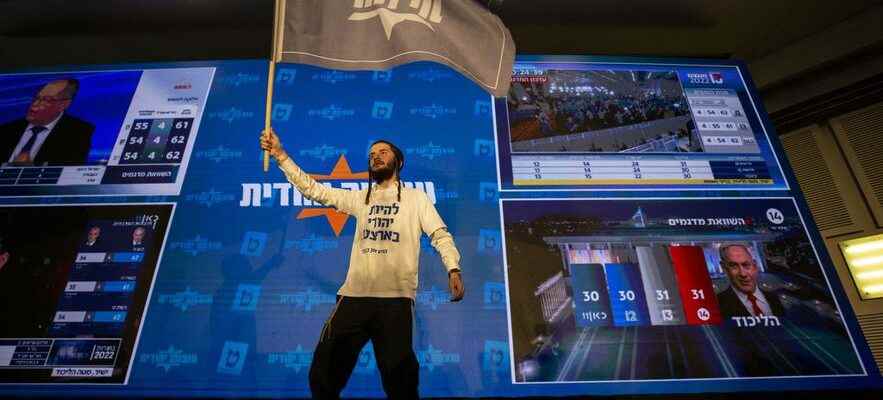On Wednesday, November 23, at around 7 a.m., two parcel bombs exploded a few minutes apart near busy Jerusalem bus stops. Result: two dead and twenty wounded. Less than two hours after the attack, Itamar Ben-Gvir already arrived on the scene and held an improvised press conference. “Terrorism must pay a very, very high price. We must resume targeted killings and toughen the conditions of incarceration of terrorists,” asserts the leader of the Jewish Power party, before going to the bedside of the wounded at Shaare hospital. Tzedek.
Where some would see a cynical exploitation of the drama, the young Arié perceives a sincere compassion. “I really enjoyed seeing him on the spot, testifies this Israeli photographer approaching his thirties. Now that he is a minister, he could have remained quietly in his office. But he always comes to support the people, he does not look like the others politicians…”
For Israeli soldiers, the right to shoot “as soon as you feel threatened”
The media activism and shock formulas of Ben-Gvir meet with an undeniable echo among Israeli youth. Arrived third in the legislative election of November 1, his list would rank, according to a poll, second among young people. More significant still: its audience goes beyond the religious Zionist circle, from which Ben-Gvir comes. In a country where the vast majority of young lay people do long military service (three years for boys, two years for girls), his campaign on the reform of the rules of engagement has won over even the very liberal Tel Aviv. “He defends the soldiers with all his might,” notes Noam, who has just completed his military service in a combat unit and works as a delivery man, before leaving to go around the world. The law hinders them and prevents them from shooting when they feel threatened, for fear of a trial. Ben-Gvir will allow them to open fire when they deem it necessary and promises to defend them no matter what. For me, this is very important.” Barely appointed minister, on November 25, this 46-year-old deputy indicated that he would authorize the police to fire on Molotov cocktail launchers.
Himself permanently armed, like many Israeli civilians, this sulphurous politician recently pointed his pistol at Palestinians during a demonstration in East Jerusalem. Disturbing irony of history: banned from serving in the Israeli army by the security services because of extremism, Ben-Gvir sets himself up today as a herald of military honor. To curry favor with him, Netanyahu concocted a custom-made morocco for him called the “Ministry of National Security”, which allows him to find himself at the head of the Israeli police, prisons and the issuance of port permits. armed.
Surprisingly, the muscular speech of Itamar Ben-Gvir also appeals to young Orthodox Jews, a community in full demographic expansion. Contrary to their parents, many students in yeshiva, Torah study centers, refuse to follow the instructions of their rabbis and voted for this ultra of Zionism. “Once elected, our Orthodox deputies do not do much in the Knesset. He addresses concrete problems and takes charge of our security,” said Yoel, a yeshiva student in Bne Berak, the large Orthodox city in the suburb of Tel Aviv.
A supporter of far-right leader Itamar Ben-Gvir celebrates the results of the legislative elections on November 1 in Jerusalem.
© / The Express
An electoral breakthrough caused by the events of May 2021
Ben-Gvir has been working on this proximity with young people for a long time. In the mid-2000s, he imposed himself at the center of the far-right galaxy, carried by the ill winds of the radicalization of religious nationalist youth. He then becomes the emblematic figure of the “young people of the hills”, these teenagers breaking with their parents – considered too lukewarm -, who set up illegal outposts on the heights of the West Bank. Ben-Gvir becomes their big brother and their media showcase, loudly celebrating their boundless devotion to the cause of greater Israel and justifying their violence against the Palestinians. When justice gets involved, he puts on his lawyer’s robe and defends them, as in July 2015, when these young people set fire to a house in the Palestinian village of Duma, killing a couple and their baby.
Last spring, Israeli television devoted a long report to the confession of a young woman from the hills who had repented and belonged to Ben-Gvir’s inner circle. She recounts the violence of off-camera speeches, the attacks against the army and the Palestinians, the fascination of young recruits for the one who is now minister. The latter, of course, denounced a web of lies and demanded one million shekels (285,000 euros) in damages for defamation.
Ben-Gvir would arguably never have achieved such a breakthrough beyond his radical base had it not been for the events of May 2021. After a particularly tense month of Ramadan in Jerusalem, Israel’s mixed Jewish-Arab towns s ignite. In Lod, Jaffa and Saint-Jean d’Acre, hundreds of rioters defy the police, burn the Israeli flag, attack civilians, set fire to homes and public places. These tragedies, of unprecedented gravity in a state where Arabs represent 1 in 5 citizens, deeply traumatized the Jewish majority. “He talks common sense, considers Michaël Ben Attar, an Israeli who has been living in Lod for a long time. The Arabs have shown us that they still dream of throwing us into the sea, we must react vigorously.”
In late November, a military court sentenced a soldier involved in an altercation with an activist from the anti-colonialist movement Breaking the Silence in Hebron, West Bank, to ten days in prison. On his jacket, the Israeli soldier wore a sticker with this inscription: “One bullet. One death. Without remorse. I decide”, one of the slogans of the campaign for the reform of the rules of engagement. Filmed on a mobile phone, the soldier had told the young activist: “The party is over for you guys, Ben-Gvir will put things in order…”
